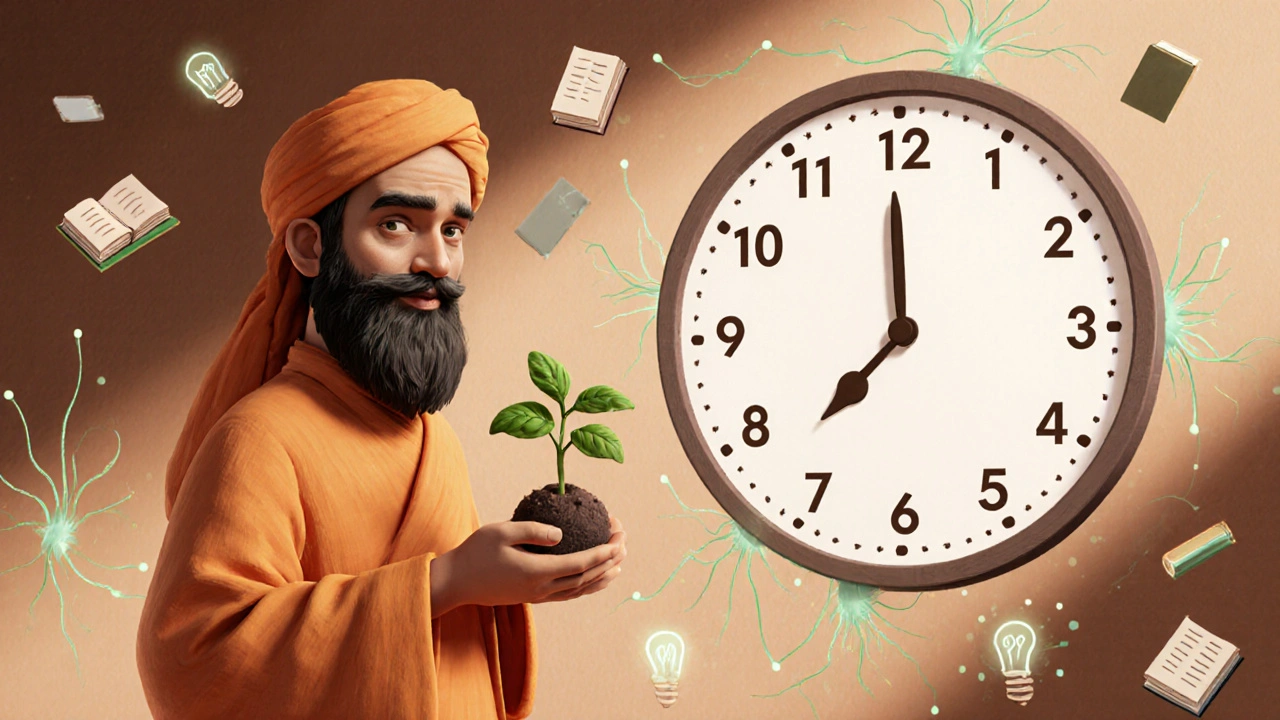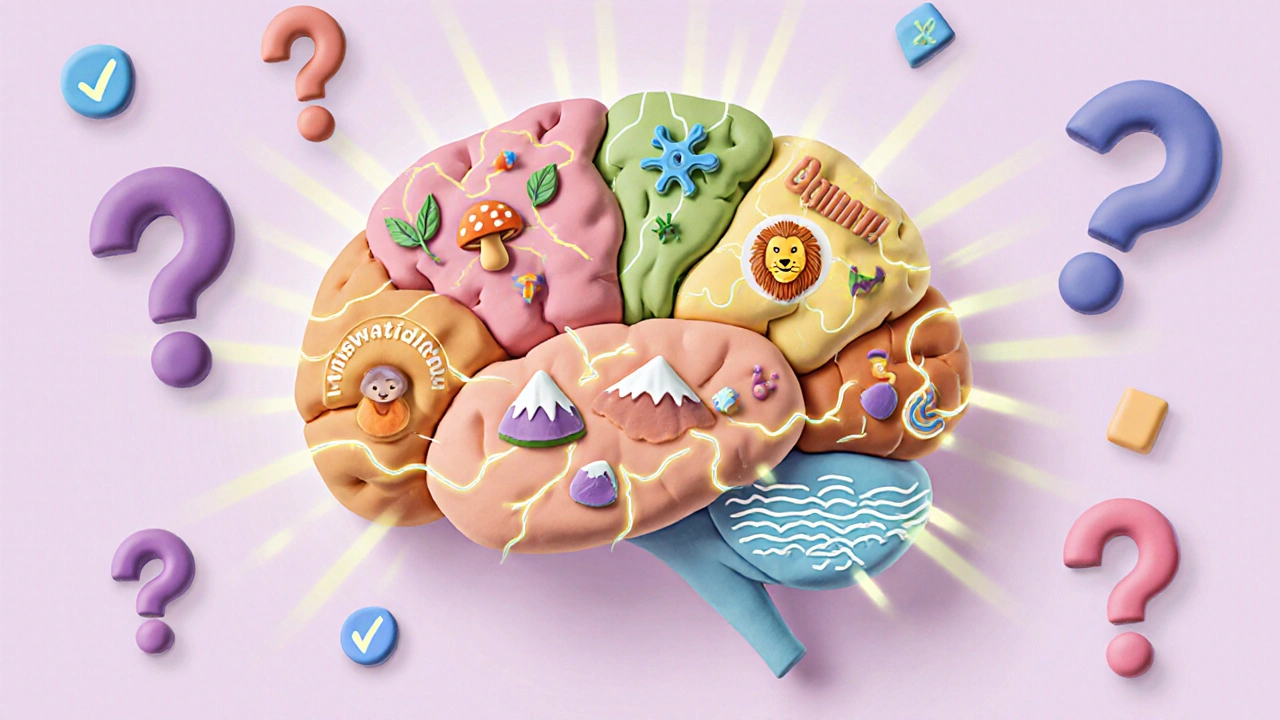Compare Brahmi with Top Alternatives for Memory and Stress Support

Brain Supplement Finder
Find Your Perfect Brain Supplement
Answer a few questions to discover which supplement best matches your needs
What's your primary brain health goal?
How soon do you need results?
Are you taking any medications or have health conditions?
What's your main concern with side effects?
When people look for natural ways to sharpen focus, calm anxiety, or hold onto memories longer, Brahmi often comes up. But what if Brahmi doesn’t work for you? Or maybe you’ve tried it and didn’t feel anything? You’re not alone. Many turn to Brahmi hoping for mental clarity, only to wonder if there’s something better out there. The truth is, Brahmi isn’t the only herb that supports brain health-and some alternatives might work faster, stronger, or with fewer side effects.
What Is Brahmi Really?
Brahmi, scientifically known as Bacopa monnieri, is a small, creeping herb used for over 3,000 years in Ayurveda. It’s not a stimulant like coffee. Instead, it works slowly, building up in your system over weeks. People take it to improve memory recall, reduce stress hormones like cortisol, and support mental endurance during long workdays or study sessions.
Studies show that after 8 to 12 weeks of daily use (typically 300-450 mg of standardized extract), users report better speed in processing visual information and improved retention of new facts. A 2012 trial with 76 adults found a 25% improvement in memory test scores after 12 weeks. But here’s the catch: you won’t feel it the next day. It’s a slow burner.
Brahmi’s active compounds-bacosides A and B-help repair damaged neurons and boost communication between brain cells. But not everyone responds. Some report mild stomach upset. Others feel nothing at all. That’s why alternatives matter.
Why Look for Brahmi Alternatives?
People switch from Brahmi for three main reasons:
- They don’t feel results after 6-8 weeks
- They get digestive discomfort
- They need something that works faster
There’s no shame in trying something else. Your brain chemistry is unique. What works for your coworker might not work for you. The goal isn’t to stick with Brahmi because it’s traditional-it’s to find what actually helps you think clearer, feel calmer, and remember more.
Alternative #1: Lion’s Mane Mushroom
Lion’s Mane (Hericium erinaceus) is a fuzzy, white mushroom that looks like a sea anemone. It’s not just for foodies-it’s one of the most promising nootropics for brain health today.
Unlike Brahmi, Lion’s Mane works differently. It stimulates nerve growth factor (NGF), a protein that helps grow and repair brain cells. This makes it especially useful for people worried about brain fog, aging, or long-term cognitive decline.
One 2020 study in Japan followed 50 adults aged 50-80 with mild cognitive impairment. After 16 weeks of taking 1,000 mg of Lion’s Mane daily, participants scored significantly higher on cognitive tests. The effects showed up faster than Brahmi-some noticed improvements in focus within 4 weeks.
It’s also gentler on the stomach. No reports of nausea. And it doesn’t need to be taken with fat to absorb well. You can take it anytime.
Alternative #2: Rhodiola Rosea
If your biggest issue is mental fatigue from stress, Rhodiola Rosea might be your best bet. This adaptogenic herb grows in cold mountain regions like Siberia and Scandinavia. It’s not for memory-like Brahmi-but for endurance.
When you’re burned out, your body floods with cortisol. Rhodiola helps regulate that. A 2009 trial with 60 people suffering from burnout showed that 400 mg of Rhodiola daily for 12 weeks reduced fatigue by 20% and improved attention span.
Where Brahmi builds memory slowly, Rhodiola gives you a mental lift within 30-60 minutes. It’s the herb you take before a big presentation, a long exam, or a day full of back-to-back meetings.
Side effects are rare, but some people feel jittery if they take it late in the day. Best taken in the morning. Also, avoid it if you’re on antidepressants-there’s a small risk of interaction.

Alternative #3: Ginkgo Biloba
Ginkgo Biloba is the old-school brain booster. It’s been studied for decades, and the data is solid. It improves blood flow to the brain, which helps oxygen and nutrients reach your neurons faster.
A 2016 meta-analysis of 35 studies found that Ginkgo improved memory and attention in healthy adults and those with mild cognitive decline. The effects were noticeable after 6 weeks, similar to Brahmi, but Ginkgo also helped with mental speed-like how fast you can switch between tasks.
One big advantage: Ginkgo works well with other supplements. Many people stack it with Omega-3s or B vitamins. It’s also available in standardized extracts with 24% flavone glycosides and 6% terpene lactones-the key active compounds.
Downside? It can thin your blood. If you’re on aspirin, warfarin, or have a bleeding disorder, skip it. Also, avoid raw ginkgo seeds-they’re toxic.
Alternative #4: Ashwagandha
Ashwagandha is another Ayurvedic herb, often called Indian ginseng. It’s not primarily a memory herb-but it’s a powerful stress shield. And since stress kills focus and memory, this makes it a strong indirect alternative to Brahmi.
In a 2019 study, 60 adults with chronic stress took 300 mg of Ashwagandha root extract daily for 60 days. Their cortisol levels dropped by 27.9%. Their anxiety scores improved by 55%. Better sleep, less mental chatter, and more mental space to think clearly.
Unlike Brahmi, Ashwagandha works on the nervous system’s stress response. If you’re the type who lies awake at night replaying conversations or dreads Monday mornings, Ashwagandha might help more than Brahmi ever could.
It’s also anti-inflammatory and supports thyroid function. But if you have an overactive thyroid or are pregnant, talk to your doctor first.
Alternative #5: Phosphatidylserine (PS)
Phosphatidylserine isn’t an herb-it’s a phospholipid naturally found in your brain cells. As we age, our bodies make less of it. Supplementing with PS helps maintain cell membrane fluidity, which keeps neurons communicating well.
Studies show 100-300 mg of PS daily improves memory, learning, and focus in older adults and even healthy young adults. One 2010 trial found that college students taking 400 mg of PS daily for 6 weeks improved their ability to recall names and faces.
It works fast-some users report clearer thinking within days. No slow build-up like Brahmi. And it’s safe for long-term use. Side effects are rare, but high doses (over 300 mg) can cause mild insomnia or stomach upset.
PS is often derived from soy or sunflower. If you’re soy-free, look for sunflower-derived PS. It’s just as effective.

How to Choose the Right Alternative
Here’s a simple guide to match your goal with the best option:
| Supplement | Best For | Time to Feel Effects | Key Benefit | Caution |
|---|---|---|---|---|
| Brahmi (Bacopa monnieri) | Long-term memory, mental clarity | 6-12 weeks | Repairs neurons, improves recall | Stomach upset, slow results |
| Lion’s Mane Mushroom | Neuroregeneration, brain fog | 4-8 weeks | Stimulates nerve growth | Expensive, rare in pure form |
| Rhodiola Rosea | Stress fatigue, mental burnout | 30 mins-2 hours | Boosts energy under pressure | Can cause jitteriness |
| Ginkgo Biloba | Focus, mental speed, circulation | 4-8 weeks | Improves blood flow to brain | Blood thinning risk |
| Ashwagandha | Chronic stress, anxiety, sleep | 2-6 weeks | Lowers cortisol, calms nerves | Thyroid interaction |
| Phosphatidylserine (PS) | Memory, learning, quick focus | Days-2 weeks | Supports cell membrane health | High doses may disrupt sleep |
If you’re overwhelmed, start here: Pick one goal. Memory? Try PS or Brahmi. Stress? Try Ashwagandha or Rhodiola. Brain fog? Try Lion’s Mane. Don’t stack five supplements at once. One at a time. Give it 4-6 weeks. Track how you feel.
What to Avoid
Don’t assume natural = safe. Some herbal blends on Amazon contain undisclosed stimulants or fillers. Look for third-party tested brands-USP, NSF, or ConsumerLab seals mean they’ve checked for purity.
Also, avoid combining Rhodiola with SSRIs or Ginkgo with blood thinners without talking to a doctor. Even natural herbs can interact.
And please, don’t buy “Brahmi 1000% stronger” powders from random websites. Standardized extracts (20% bacosides) are the only ones backed by science. Everything else is guesswork.
Final Thoughts: It’s Not About Brahmi vs. Alternatives
The real question isn’t whether Brahmi is better than the rest. It’s: what does your brain need right now?
If you’re studying for exams and need long-term retention, Brahmi still holds up. If you’re juggling a high-pressure job and crashing by 3 p.m., Rhodiola might be your lifeline. If you’re over 50 and noticing your memory slipping, Ginkgo or PS could make a real difference.
There’s no one-size-fits-all brain supplement. The best choice is the one that matches your symptoms, your lifestyle, and your body’s response. Try one. Wait. Observe. Adjust. Your brain will tell you what it needs.
Is Brahmi the same as Bacopa?
Yes. Brahmi is the common name for Bacopa monnieri. In Ayurveda, the term "Brahmi" sometimes refers to other plants like Centella asiatica, but in modern supplements and research, Brahmi always means Bacopa monnieri.
How long does it take for Brahmi to work?
Most people need 6 to 12 weeks of daily use to notice improvements in memory and focus. Unlike stimulants, Brahmi works by slowly repairing brain cells and improving communication between neurons. Don’t expect instant results.
Can I take Brahmi and Ashwagandha together?
Yes, many people combine them safely. Brahmi supports memory and mental clarity, while Ashwagandha reduces stress and cortisol. Together, they can help with both focus and calm. Stick to standard doses: 300 mg Brahmi and 300 mg Ashwagandha extract daily.
Which is better for anxiety: Brahmi or Rhodiola?
Rhodiola is better for acute stress and anxiety tied to fatigue or burnout. It gives a quick calming effect. Brahmi helps with long-term anxiety by improving brain resilience, but it’s slower. If your anxiety comes from being overwhelmed, try Rhodiola first.
Do Brahmi alternatives have side effects?
Most have mild side effects if taken in excess. Lion’s Mane can cause itching in rare cases. Ginkgo may increase bleeding risk. Rhodiola can cause insomnia if taken late. PS may cause stomach upset. Always start with the lowest dose and increase slowly.
Can I use these supplements if I’m on antidepressants?
Some can interact. Rhodiola and St. John’s Wort may affect serotonin levels. Ginkgo can increase bleeding risk with SSRIs. Always talk to your doctor before combining herbal supplements with prescription meds.
Where should I buy Brahmi or its alternatives?
Look for brands that list standardized extracts (e.g., "50% bacosides" for Brahmi) and have third-party testing (USP, NSF, or ConsumerLab). Avoid products with vague terms like "herbal blend" or "proprietary formula." Stick to reputable health stores or direct-from-manufacturer sites with transparency.
Next Steps
Start by writing down your top brain health goal: Is it memory? Focus? Stress? Pick one supplement from the table that matches. Buy a 30-day supply. Take it daily at the same time. Keep a simple journal: rate your focus, energy, and mood on a scale of 1 to 10 every Friday. After four weeks, compare your notes. You’ll know faster than you think whether it’s working.
And if it’s not? Try another. Your brain is unique. You deserve a solution that fits you-not just what’s trendy.

Margaret Wilson
November 20, 2025 AT 03:38Okay but like… Brahmi made me feel like my brain was wrapped in wet cardboard for 8 weeks 🤡 I switched to Lion’s Mane and now I remember where I put my keys. Also my cat stopped judging me. Worth it.
william volcoff
November 21, 2025 AT 10:33Good breakdown, but you missed one key point: Rhodiola’s half-life is short. If you take it at 7 PM, you’re gonna be wide awake at 2 AM. Also, PS from sunflower is the way to go-soy-derived versions can trigger inflammation in sensitive folks. Been using 100mg daily for 6 months. No crashes, no jitters. Just steady focus.
Freddy Lopez
November 23, 2025 AT 00:05The real insight here isn’t about which herb is ‘better’-it’s about recognizing that cognitive function isn’t a single knob to turn, but a symphony of systems. Brahmi repairs, Rhodiola modulates, PS stabilizes, Lion’s Mane regenerates. We’re not choosing supplements-we’re tuning our neurochemistry. The arrogance of the ‘one-size-fits-all’ supplement culture ignores the profound individuality of human biology. What works for one is noise to another.
Brad Samuels
November 23, 2025 AT 06:47Just wanted to say thank you for writing this. I’ve been struggling with brain fog since my kids were born, and I felt so guilty for not being ‘sharp’ anymore. Reading about PS and how it helps with cell membrane health… it finally made me feel like my brain wasn’t broken, just under-resourced. I started 100mg of sunflower PS last week. I don’t feel ‘wired’-I just feel… present. Like I’m finally home in my own head.
Hannah Machiorlete
November 24, 2025 AT 15:18So you’re telling me I wasted 3 months on Brahmi because I’m just not smart enough to wait? Lmao. I’m out. Gonna go buy a coffee and call it a day.
Bette Rivas
November 25, 2025 AT 07:55While the comparative analysis is generally accurate, it’s important to note that the 2012 Brahmi trial cited had a small sample size (n=76) and was conducted under controlled conditions-real-world adherence rates are typically lower due to gastrointestinal side effects, which occur in up to 28% of users according to a 2018 meta-analysis in the Journal of Alternative and Complementary Medicine. Furthermore, Lion’s Mane’s NGF stimulation is primarily observed in vitro; human neuroregeneration evidence remains preliminary. Always consider bioavailability: many commercial extracts use ethanol-based solvents that degrade bacosides, rendering them ineffective. Look for water-extracted, standardized 20% bacoside products from reputable vendors with HPLC validation.
prasad gali
November 27, 2025 AT 02:42Pathetic. You listed Ginkgo without mentioning its CYP450 inhibition profile? Amateur. And PS from sunflower? That’s marketing fluff-only soy-derived PS has the phosphatidylcholine co-factors necessary for neuronal uptake. You’re giving people misinformation disguised as wisdom. If you don’t know your pharmacokinetics, don’t write articles. Go back to Ayurveda school.
Paige Basford
November 28, 2025 AT 08:25Wait, so if I take Ashwagandha and Rhodiola together, does that mean I’m basically doing a nootropic stack? I read somewhere that’s called ‘neuro-optimization’? I think I’m becoming a biohacker now 😅 I’m gonna try it with my morning coffee and report back. Also, anyone know a good brand for Rhodiola that’s not $40 a bottle?